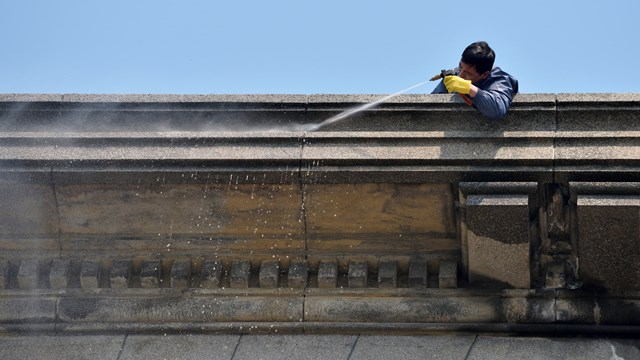It’s three o’clock in the morning and your building’s boiler has just broken down. Your property manager is woken from his sleep by a phone call from the superintendent telling him that there’s a catastrophe at hand. You’re left shivering in your apartment while those hired to protect your home scurry to manage the crisis. Could this have been avoided?
While an integral part of building maintenance is the ability to respond to a crisis, the more essential aspect of building upkeep is preventive maintenance. A properly devised preventive maintenance program will anticipate problems by detecting flaws and potential hazards thorough ongoing trouble-shooting. Rather than relying on fixing things when they are broken, building crises can be kept at bay and you can be confident that your building systems will operate smoothly.
The Importance of Planning
To ensure smooth operation, a preventive maintenance master plan must be constructed with daily, weekly, monthly, semiannual, and annual items grouped together. Maintenance checklists are invaluable in such a plan. The House Institute, an organization dedicated to providing New York City co-ops and condos with tips on how to run their building, suggests a format for a superintendent’s maintenance log. Says director Dick Koral, "The particular form of the preventive maintenance log is not important. Each building can develop the form that suits it best. For convenience, those chores that are daily or weekly are listed first in a weekly log. Following would be a monthly log and, finally, a log of items that are checked annually, bi-annually, or more infrequently– say, every five years."
Lists include every aspect of building maintenance, including the proper inspection frequency of roofs, walls, windows, doors, burners, boilers, piping, flues and chimneys, and more. Although obviously the particular lists will vary from one building to the next, Koral says the employment of such a method is key to a successful preventive maintenance plan. "The division of work between the building staff and outside service contractors is arbitrary but the important thing is that all the preventative maintenance chores are listed, so that none is overlooked."
Keeping Records
While some management firms rely on completing standard checklists for daily inspections, others rely on the superintendent’s log of activities. Whatever method they choose, managers agree that a written account of maintenance is essential in a building’s upkeep. Says Robert Grant, director of property management at Diversified Property Management in Queens, "We use various forms for the super to fill out. Some are just simple checklists." Most importantly, however, Diversified requires superintendents to keep a log book of daily activities. In most buildings, logged entries are required for all of the work going on each day. Diversified’s policy is that a written record must be kept of "all accidents, breakdowns, shutdown of elevators, special inspections by any city department, time in and time out of all outside vendors, and any complaints from tenants."
Hector McKenzie, superintendent of The Mayflower, a 117-unit co-op at 245 East 87th Street, says, "We don’t use checklists, but I keep a daily log of absolutely everything–every leak, every light bulb, boiler checks, etc." It’s important for a super to be familiar with every aspect of the building and daily inspections are an essential part of detecting any possible problems. McKenzie, whose been a super for nine years at the Rose Associates-managed building explains, "I keep a record of who moves in and out, what apartments tend to have the most difficulties, all repairs and all routine checks."
Every super has his own standard routine, whether they walk the stairs first or inspect the lobby. McKenzie says, "If I don’t have an appointment with a tenant, the first thing I do is check the boiler. Then I check the pipes and flush out any blockages, purge the water tank if necessary, and I always check the roof." McKenzie’s work schedule is usually Monday through Friday, from 8 am to 4 pm, but, as he explains, "I live in the building and am usually on call after eight." He quips, "I’m like a doctor, you can always reach me."
The super is not on his own, however, in the upkeep of a building. McKenzie says he is in close contact with the building’s managing agent Rob Werner. "We meet once a week to go over everything in my log, but we’re on the phone daily." Koral suggests that every log page provide space for the building superintendent and the manager to sign and date. In this way, misunderstandings between them are minimized.
Setting the Standard
While an annual program can be devised by the super, managing agent, and building board, the property manager is the essential part of a successful program. Even though, for the most part, the managing agent will not be the individual scanning the building for potential problems, it is his or her responsibility to set maintenance schedules and establish/maintain standards.
According to Grant, "Our goal is to train the super and maintain accountability for his time. We hold him accountable to an established standard." It would be helpful if a building employs the use of an official superintendent manual which details the super’s job description and provides a permanent guide to his responsibilities and preventive maintenance procedures. Says Grant, "The superintendent is responsible at all times for the entire operation and overall condition of the building."
A manager’s role is to oversee the super’s maintenance activities, on both a daily and seasonal level. Grant provides supers with a code compliance checklist which is "needed throughout the year during regular inspections to avoid violations and fines." He explains that another particularly important part of the manager’s and, in turn, the super’s job is to "test and tone building equipment right before a heavy usage season. Making sure everything is working properly saves the building money by avoiding emergencies." He adds that saving money is not their only consideration. "The most important aspect of this seasonal preparation is to avoid breakdowns and the inconvenience to building residents who may lose their heat in the dead of winter."
What’s it Worth?
While the ability to handle an emergency is important, merely responding to emergencies has disadvantages. The value of preventive maintenance surely exceeds the costs of relying on crisis management alone. The money saved by ignoring regular maintenance will eventually be spent in a crisis many times over. Just think about how much more expensive it is to make emergency repairs, especially since they often occur at odd hours. Major purchases of mechanical equipment needed to get running again in a crisis situation will not subject to a competitive price– a lot of money will have to be spent to get the building back on its feet quickly. Also, consequential damages can be costly. For example, the water damage created by a leaking roof may cost more to repair than the preventive patch in the roof. Moreover, the goodwill lost to the shivering tenant during a boiler break-down may be irreplaceable.
McKenzie believes that checking everything out on a daily basis is key to keeping the peace. When asked what was the worst catastrophe he ever experienced, he referred to his log and recalled June 4, 1997: "A sprinkler line broke at the entrance to the building causing four feet of water to ruin the burner pumps. It was a disaster." Michael Wolfe, president of Midboro Management in Manhattan says that dilemmas such as these are sometimes unavoidable but the key is trying to do everything possible to prevent them. "When you’re running a building, of course there are going to be things that go wrong. Sometimes there’s no way around a particular problem. It’s our job, along with the super, to do our best to keep everything running smoothly and keep residents comfortable."
Following a thorough preventive maintenance plan such as the one above, can save your building thousands of dollars in emergency repairs, and can even lengthen the life of some essential equipment. In addition, it will help the building staff and management stay on top of potential problems, and keep residents more comfortable and satisfied.
Ms. Grover is the managing editor of The Cooperator.







2 Comments
Leave a Comment